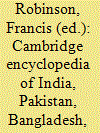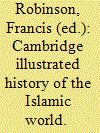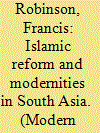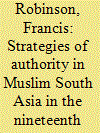|
|
|
Sort Order |
|
|
|
Items / Page
|
|
|
|
|
|
|
| Srl | Item |
| 1 |
ID:
035484


|
|
|
|
|
| Publication |
Cambridge, Cambridge University Press, 1989.
|
| Description |
520p.hbk
|
| Standard Number |
0521334519
|
|
|
|
|
|
|
|
|
|
|
|
Copies: C:1/I:0,R:0,Q:0
Circulation
| Accession# | Call# | Current Location | Status | Policy | Location |
| 030802 | 954.003/ROB 030802 | Main | On Shelf | General | |
|
|
|
|
| 2 |
ID:
001864


|
|
|
|
|
| Publication |
Cambridge, Press Syndicate of the University of Cambridge, 1996.
|
| Description |
xxiii, 328p.Hbk
|
| Standard Number |
0521435102
|
|
|
|
|
|
|
|
|
|
|
|
Copies: C:1/I:0,R:0,Q:0
Circulation
| Accession# | Call# | Current Location | Status | Policy | Location |
| 042847 | 909.097671/ROB 042847 | Main | On Shelf | General | |
|
|
|
|
| 3 |
ID:
039990


|
|
|
|
|
| Publication |
DelhI, Chankya publications, 1987.
|
| Description |
viii, 480p.
|
| Standard Number |
8170010268
|
|
|
|
|
|
|
|
|
|
|
|
Copies: C:1/I:0,R:0,Q:0
Circulation
| Accession# | Call# | Current Location | Status | Policy | Location |
| 028249 | 324.209540354/BRA 028249 | Main | On Shelf | General | |
|
|
|
|
| 4 |
ID:
047882


|
|
|
|
|
| Publication |
New Delhi, Oxford University Press, 2000.
|
| Description |
viii, 299p.
|
| Standard Number |
095649672
|
|
|
|
|
|
|
|
|
|
|
|
Copies: C:1/I:0,R:0,Q:0
Circulation
| Accession# | Call# | Current Location | Status | Policy | Location |
| 043753 | 297.0954/ROB 043753 | Main | On Shelf | General | |
|
|
|
|
| 5 |
ID:
081605


|
|
|
|
|
| Publication |
New Delhi, Oxford University Press, 2007.
|
| Description |
vii, 308p.
|
| Standard Number |
9780195683806
|
|
|
|
|
|
|
|
|
|
|
|
Copies: C:1/I:0,R:0,Q:0
Circulation
| Accession# | Call# | Current Location | Status | Policy | Location |
| 053299 | 297.0954/ROB 053299 | Main | On Shelf | General | |
|
|
|
|
| 6 |
ID:
082161


|
|
|
|
|
| Publication |
2008.
|
| Summary/Abstract |
From the beginning of the Islamic era, Muslim societies have experienced periods of renewal (tajdid). Since the eighteenth century, Muslim societies across the world have been subject to a prolonged and increasingly deeply felt process of renewal. This has been expressed in different ways in different contexts. Amongst political elites with immediate concerns to answer the challenges of the West, it has meant attempts to reshape Islamic knowledge and institutions in the light of Western models, a process described as Islamic modernism. Amongst 'ulama and sufis, whose social base might lie in urban, commercial or tribal communities, it has meant 'the reorganisation of communities . . . [or] the reform of individual behavior in terms of fundamental religious principles', a development known as reformism. These processes have been expressed in movements as different as the Iranian constitutional revolution, the jihads of West Africa, and the great drives to spread reformed Islamic knowledge in India and Indonesia. In the second half of the twentieth century, the process of renewal mutated to develop a new strand, which claimed that revelation had the right to control all human experiences and that state power must be sought to achieve this end. This is known to many as Islamic fundamentalism, but is usually better understood as Islamism. For the majority of Muslims today, Islamic renewal in some shape or other has helped to mould the inner and outer realities of their lives
|
|
|
|
|
|
|
|
|
|
|
|
|
|
|
|
| 7 |
ID:
001577


|
|
|
|
|
| Publication |
DelhI, Oxford University Press, 1997.
|
| Description |
xx, 468p.Pbk
|
| Standard Number |
0195631269
|
|
|
|
|
|
|
|
|
|
|
|
Copies: C:1/I:0,R:0,Q:0
Circulation
| Accession# | Call# | Current Location | Status | Policy | Location |
| 041124 | 954.03/ROB 041124 | Main | On Shelf | General | |
|
|
|
|
| 8 |
ID:
121943


|
|
|
|
|
| Publication |
2013.
|
| Summary/Abstract |
Starting from the position that authority is constantly a work in progress, this paper examines authority in Muslim South Asia at a time when Muslims felt the challenge of rule by another civilization. It examines the strategies in sustaining their authority: of religious leaders, of Unani hakims and of literary leaders. In all three areas there is a rejection of the Persianate Mughal past and an embracing of Arab models, of the Prophetic model, and in various ways a drawing on British models and British authority. The paper also looks at the strategies of the rulers noting, amongst other things, how the British drew heavily on Mughal models just as Indian Muslims were letting them go, and how, since independence, Muslim rulers have drawn on a mixture of Western, Arab and Prophetic sources. There is also a running discussion throughout the paper of the revolutionary shift towards rooting authority in society at large, and the development of techniques to do so.
|
|
|
|
|
|
|
|
|
|
|
|
|
|
|
|
|
|
|
|
|